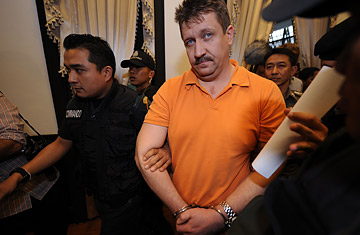
Accused Russian arms dealer Viktor Bout is led by Thai authorities to a showing before the media in Bangkok, Thailand, March 7, 2008.
Viktor Bout may have started to believe the hype. While negotiating his most recent arms deal, Bout had his associate give the potential buyers a copy of a recent magazine article about him titled "The Merchant of Death" — just so they'd know who they were dealing with. After almost two decades of outfoxing authorities while supplying weapons to the most deadly conflicts around the globe, the former Soviet Air Force pilot let his guard down just as a complex web of international police agencies were closing in on him. The potential buyers said they represented the leftist Colombian rebel group FARC — but they turned out to be part of a U.S.-led sting operation that had lured him out of his Russian refuge and tracked him through South America, Europe and Asia. On Thursday, he was finally arrested in Bangkok, Thailand.
The doughy, broad-shouldered 41-year-old Russian whom Thai police paraded before the press on Friday in an orange golf shirt is a monstrous example of entrepreneurial business acumen gone over to the dark side. He is believed to have supplied arms to the warring factions in Afghanistan, including the Taliban, as well as the perpetrators of some of the worst violence in Africa's interminable civil wars. Experts believe he has shipped AK-47s to every corner of the world. He even appears to have used U.S. airbases in Iraq in 2004 as part of his arms trafficking. He had a shadowy financial network stretching from Europe to Africa to the Middle East. And he apparently dealt with any kind of weapon a potential buyer wanted. He was set to close a deal with the fake FARC representatives involving surface-to-air missiles and armor-piercing rocket launchers. His fee for delivering the weapons would have been $5 million.
Bout was both a product of the post-Cold War era and a master of its chaos. After the collapse of the Soviet Union, the industrious 25-year-old saw an opportunity to turn dozens of military cargo planes that were sitting unused on military runways into a multimillion-dollar transport business.
Amid one of his first big shipments — sending crates of fresh-cut South African gladiolas into the United Arab Emirates — Bout realized it was wasteful flying into Africa with empty planes. According to Merchant of Death: Money, Guns, Planes and the Man Who Makes War Possible, a book on Bout written by Douglas Farah and Stephen Braun last year, Bout began to fill his Africa-bound aircraft with stockpiles of Soviet weapons to sell to some of Africa's most notorious regimes and rebel groups. As his business expanded, Bout found himself selling weapons on both sides of the conflicts. In the 1990s, according to Farah and Braun, Bout was flying in guns to the Northern Alliance and the Taliban government they were trying to depose.
As business expanded, so did the mythology that began to build up around him. Articles were written about him. And a book. And a screenplay. He gave radio interviews in Moscow. Nevertheless, in the 1990s, there were few known photographs of him. In 2003, however, he agreed to an interview with the New York Times Magazine and stood for a portrait dressed in a nappy tan suit. In the interview, Bout tried to paint himself as a hard-working entrepreneur, vegetarian and nature lover who just happened to spend a lot of time flying into African conflict zones.
In the meantime, law enforcement agencies were catching up to Bout. In 2002, the Belgian government charged him with laundering $325 million. In 2005, the same year Nicolas Cage played a character based on Bout in the Hollywood film Lord of War, the U.S. Treasury placed Bout in the Specially Designated Nationals list, an action that threatened to impose economic sanctions against anyone conducting business with Bout. U.S. officials believe Bout is worth hundreds of millions of dollars. A 2007 email that is part of the investigation that lead to Bout's arrest said the sanctions effectively froze about $6 billion of his transactions.
The freeze may explain why Bout was willing to stick his neck out for new business. The U.S. Drug Enforcement Agency's (DEA) sting operation came together relatively quickly. According to the charging documents filed with the Southern District of New York, a confidential source working for the DEA emailed an associate of Bout in November to arrange for an arms shipment FARC. Using the code words "farming equipment" in the emails, Bout's intermediary allegedly planned for 100 Russian-made Ingla surface-to-air missiles to be air-dropped into FARC territory inside Colombia. After meetings in Curacao, Copenhagen and Bucharest, the DEA, through confidential sources, arranged for Bout to travel to Bangkok, Thailand to finalize the deal on March 6. That's when the Royal Thai police, working with the DEA, arrested him on charges of providing material support of a foreign terrorist organization, a designation slapped on FARC by the U.S. in 1997.
Now that Bout's in custody, getting him in front of an American judge will be difficult. Thai authorities, who seem to be enjoying the publicity, said they are considering trying him in Thailand first before extraditing him. Other countries like Belgium, South Africa and the United Arab Emirates have also been investigating Bout. The Russian media has reported that the Kremlin may request Thailand extradite him to Moscow, where he has been living in recent years. If that happens, it is unlikely he would face any charges at all. But, for Viktor Bout, it doesn't look like he gets to write his own ending.
